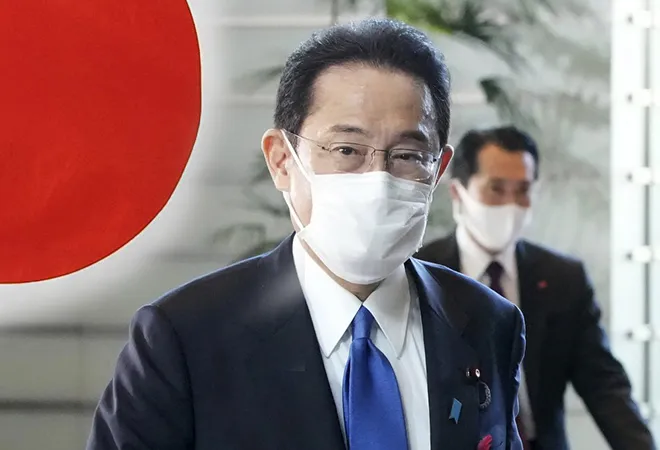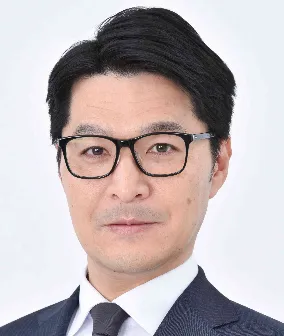
Once again, Japan has unveiled an emotive foreign policy vision in New Delhi. More than 15 years after the late Shinzo Abe pronounced his pivotal “Confluence of the Two Seas” speech at the Indian Parliament in August 2007, Japan is at it again. This time, it was Japan’s Prime Minister Fumio Kishida who disclosed a new plan for a “Free and Open Indo-Pacific” (FOIP) at the Indian Council of World Affairs (ICWA) in March 2023.
As promised by Kishida at last year’s Shangri-La Dialogue in Singapore, Japan’s new FOIP plan is dubbed “The Future of the Indo-Pacific”, with a clear-cut subtitle of “Together with India, as an Indispensable Partner”. In Delhi, the Japanese Prime Minister articulated Tokyo’s ideational foundations in what it hopes will shape worldviews, and consequently the world’s future. With this objective, Kishida not only spelt out the FOIP’s raison d'être but also India’s important role, as well as a refined approach to the so-called Global South with a persuasive narrative and ample funding.
As Kishida declared, Japan wants to propose “a guiding perspective” for a world on the verge of “division and confrontation”.
The new plan is Japan’s vision of global responsibility in a nutshell. As Kishida declared, Japan wants to propose “a guiding perspective” for a world on the verge of “division and confrontation”. Bearing in mind the Russia-Ukraine War, his speech forcefully described the lack of common understanding and indifference to fundamental norms in today’s fractured world. Kishida decried this situation as “a strong centrifugal force” within the international community regarding a “perspective” at its most basic level. Japan’s new FOIP plan is therefore meant to fill this critical gap and foster an easy, collective spirit of collaboration.
Tokyo’s bold Indo-Pacific strategies
Attesting to the scale of its ambitions, Tokyo’s plan pledges an impressive US$75 billion in public and private funds for infrastructure assistance and investment in the Indo-Pacific by 2030. Despite being silent on the matter, this will complement a “Partnership for Global Infrastructure and Investment” (PGII) launched by the Group of Seven (G7) last year, of which Japan is this year’s president.
Kishida set forth four new pillars of cooperation. These are (1) Principles for Peace and Rules for Prosperity; (2) Addressing Challenges in an Indo-Pacific Way; (3) Multi-layered Connectivity; and (4) Extending Efforts for Security and Safe Use of the “Sea” to the “Air”. Whereas some pillars and their individual elements overlap with Japan’s previous “three pillars”, these are more concrete and contain new dimensions. Nevertheless, the bottom line remains the same: Tokyo’s unwavering support for the international order based on the rule of law.
“Can we not collectively reaffirm and promote the minimum basic principles that the international community should uphold?” Kishida rhetorically asked in his speech. In explaining the first pillar, he spoke of the “backbone” of Japan’s FOIP. Condemning Russia’s aggression against Ukraine, he rightly announced Japan’s opposition to “any unilateral changes to the status quo by force anywhere in the world” (emphasis added). Kishida further advocated for “a free, fair and just economic order that does not foster division” and “ulemaking to prevent opaque and unfair development finance”. Addressing these political and economic forms of coercion, then, constitutes FOIP’s important elements.
The second pillar addresses “challenges in an Indo-Pacific way” and proposes a “new focus of cooperation for FOIP” that features the “global commons.” It espouses climate change, the environment, global health, and cyberspace. According to Kishida, Japan will address these challenges, thereby “enhancing the resilience and sustainability of each society”.
The FOIP’s core element of “multi-layered connectivity” is the third pillar. Referring to the need for economic growth, Kishida warned against “the kind of connection that relies solely on one country” and clarified Japan’s aim for “increasing each country’s options”. He then specified the “three important regions” of Southeast Asia, South Asia, and the Pacific Islands region.
As in the past, Japan focuses on maritime security in the fourth pillar, yet further advances public domain security through “ensuring safe and stable use of the air”. “The law is there to protect the weak”, Kishida noted and emphasised the importance of international law and the prohibition of the use of force or coercion.
Diversity, inclusiveness, and openness
The new FOIP is Japan’s mission and vision statement, and it comes at a watershed moment in history as the revisionism and revanchism of authoritarian regimes threaten to fundamentally change how our world runs. Tokyo’s message to the world is, therefore, deeply stirring but also thoughtfully crafted. This is because Tokyo, as a thought leader, is making the boldest attempt yet to define the rules of the game for all players.
Japan’s new FOIP is addressed to the numerous, third-party fence-sitters in the political South who seek a comfortable middle position in the strategic competition between the United States (US) and China or do not condemn the Russian aggression against Ukraine. Japan’s leaders are hoping that the new FOIP, supported by its “four pillars”, will be broadly acceptable to many so as to turn the trick and elicit their endorsement.
Tokyo’s new plan upholds respect for diversity, inclusiveness, and openness. As importantly, the Japanese Prime Minister declared, “We do not exclude anyone, we do not create camps, and we do not impose values”. By refusing exclusion and the idea of camps, Japan displays a higher moral standard vis-à-vis China’s dominating, hegemonic attempts. By refusing to impose values, Japan differentiates itself from other Western countries, in particular the US. In that spirit, and reflecting Japan’s previous approach, it proposed what Kishida termed “rulemaking through dialogue”, which “respects the historical and cultural diversity of each country, and ‘equal partnership’ among nations”.
By refusing exclusion and the idea of camps, Japan displays a higher moral standard vis-à-vis China’s dominating, hegemonic attempts. By refusing to impose values, Japan differentiates itself from other Western countries, in particular the US.
Inclusivity for Japan entails countries showing support for “free and open” measures to ensure a peaceful international order and a secure public domain. This is meant to engender dialogue and cooperation. It paves the way for countries from the South to take meaningful actions in their own way and time. If they choose to adopt some kind of common denominator that affirms their commitment to peace, territorial integrity, and sovereignty―similar to ASEAN’s Indo-Pacific Outlook—these will be simply reaffirming dearly-held principles of international law. In the process, however, they will implicitly condemn Russia and China’s illegal acts and raise the standard of the Indo-Pacific higher in the process.
Despite its compelling and forthright message, Japan’s intention is made moderately and without pretension. Employed strategically, the word “inclusive” demonstrates Japan’s convergence with India’s free, open, and inclusive Indo-Pacific, pronounced by Prime Minister Narendra Modi. Inclusivity should pragmatically open the door to engagement with as many diverse partners as possible.
As Kishida’s visit illustrates, Japan welcomes an increasingly influential and confident India, but one that is firmly anchored in the Indo-Pacific partnership, but less so in BRICS. It also wants to encompass as much of the “Global South” as possible. His speech makes it clear that Japan wants to see a world where “diverse nations coexist and prosper together under the rule of law”. To that end, without altering Tokyo and Abe’s “free and open” vision, Kishida’s new FOIP astutely emphasises “inclusivity” and avoids potentially divisive terms like “human rights” and “democracy”.
Japan’s “meta-narrative” on normativity
When referring to the “Indo-Pacific” and stressing Southeast Asia, South Asia, and the Pacific Islands, Tokyo’s view does appear informed by classical geopolitics. Nevertheless, as in the past, the FOIP is about normativity―the way the world should be―as well as an illustration of the fight against revisionism of the world as it has been.
Along with India, Japan is a critical stakeholder in a stable rules-based order.
For Kishida, defending freedom and the rule of law is “at the root of the concept of FOIP”. Japan’s Indo-Pacific programmes and vision aim to safeguard the rules-based international order from a systemic challenge. Being inclusive and normative, Japan calls on other states―like-minded or not―to agree on “the minimum basic principles”, meaning the fundamental principles of international law. It is a conservative vision of the world, as befits Japan’s outlook, yet it has something in it for everyone. This is true for many vulnerable countries because, as Kishida says, they “are in greatest need of ‘law’”.
These form the guiding perspective, or the “meta-narrative”, which Tokyo is offering the world. Given almost eight decades of responsible statecraft, Japan is one of the few countries that can make such a stirring call without blushing. Kishida’s speech astutely tried to nudge hedging middle powers to cooperate in defence of established common norms. Choosing sides, per se, between China and the US is neither expected nor required. What Japan wants is a world where coercion and predation are not countenanced.
Our world is at a historical juncture, where the rule of force―as practised by authoritarian regimes―may perilously become the norm. Along with India, Japan is a critical stakeholder in a stable rules-based order. Both possess mutual values and interests that are shared by much of the world. Illustrating such dynamics, the new FOIP with its empathetic narrative finds common ground that may conclusively be able to dispel increasingly polarised worldviews.
Dr Kei Hakata is a professor at Seikei University, Japan, teaching international politics and security affairs.
Dr Brendon J. Cannon is Assistant Professor International Security at Khalifa University of Science and Technology, Abu Dhabi, UAE.
The views expressed above belong to the author(s). ORF research and analyses now available on Telegram! Click here to access our curated content — blogs, longforms and interviews.




 PREV
PREV



